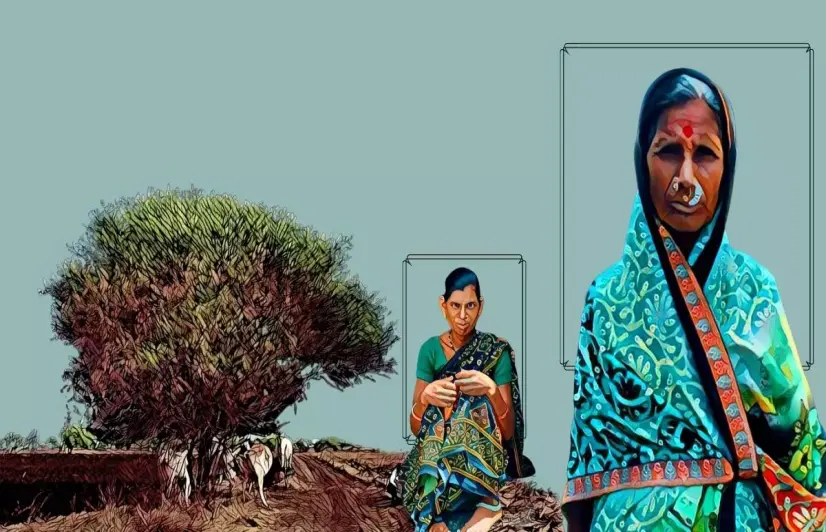Photo Essay: The Pardhi struggle for Jal-Jameen

Photo Essay: The Pardhi struggle for Jal-Jameen
“The borewell dries up every summer, and the sarpanch does not care. Also, there is no sign of the permanent houses we were promised two years ago,” says Sushila Sanjay Kare.
Sushila lives in a settlement located on a remote patch in Dhakephal, about 180 km from Kaij in Beed district of Maharashtra. She belongs to the Pardhi tribe, considered an outcast by the dominant Marathas.
As per the 2011 Census, Pardhi population in Beed district stands at 5,556, while it is 2,23,527 in the whole of Maharashtra. According to Bhavna Menon, programme manager, Last Wilderness Foundation, the tribe worked for the ruling kings and the British, before taking to hunting. “In 1871, the British outlawed them under the Criminal Tribes Act, along with 150 other communities, and stamped them as hereditary criminals. Although this Act was repealed in 1952 to bring Pardhis under the classification of nomadic denotified tribes, the stigma still continues,” explains Menon.
Sushila Sanjay Kare
Anjana Chagan Kare felt lucky when she spotted a heap of chana dal dropped on roadside. She brought it home to make puranpoli (a sweet lentil filled chapati) for her family of eight. The marginalised tribe she belongs to always battles with food insecurity. On favourable days, she gets some leftover curry along with stale rotis. On the worst of days, she chews on leaves!
Every time Anandgaon village, 60 km from Kaij, witnesses a wedding, 200-member-strong Pardhi settlement on the fringes turn both hopeful and distressed.
“We wait until the wedding is over. Before stray dogs could claim their share, we pounce on the dustbins hoping to grab some leftovers,” says Sunita Govind Kare, portraying the sense of deprivation that chokes the members of the nomadic tribe, considered to be the descendants of Maharana Pratap.
Anjana Chagan Kare
The empty kitchen of a Pardhi household shows the grim reality of their food security
Jaibai Motiram Kare
12 years ago, Rajjubai Vilas Kare lived through the worst days of her life when her husband Vilas Motiram Kare lost a leg and his ability to speak in a road accident. Panicked, Rajjubai rushed to Kaij government hospital, where the medical staff made her wait in the compound.
“When he lost consciousness due to pain and bleeding, I screamed for help. Only then did a medical practitioner attend to him. The doctor just bandaged the bleeding leg, handed over some pills and instructed me to take him home.”
Rajjubai had to drag a subconscious Vilas all the way home, as walking was the only mode of transport available for her.
Rajjubai Vilas Kare along with her husband Vilas Motiram Kare
Once, when traditional remedies failed, Gita Dhananjay Shidey walked seven km to the nearest primary health centre (PHC) carrying her child suffering from severe fever. She waited for hours outside the gate, only to be met with sheer disgust. The healthcare workers refused to touch the patient, calling both “a walking disease”. “The doctor did not examine my child, but threw a medicine strip at me from a distance,” she adds.
Pardhis neither receive immunisations nor are visited by ASHA workers.
Gita Dhananjay Shidey
Pardhis are hired neither for harvesting sugarcane—a major crop in the region—nor for menial tasks. They grow soybean for personal consumption and try to sell the surplus. But they claim nobody buys from them due to the practice of untouchability. Recently, some Pardhis have been rearing goats hoping to sell them for some money.
As per a report from the Tribal Development Department of Maharashtra, the development plan for housing facility, road access and subsidised vocational training o Pardhis has been in place since 2011. It claims the community has benefited, but the reality is different.
Shripad Mehetre, Assistant Project Officer, Aurangabad Tribal Development Department, acknowledges the scheme's lapse. Mehetre could not provide beneficiary data for the livelihood enhancement programmes for Pardhis. Another source from the same department says on condition of anonymity that “there is neither any budget consistency from the state government nor anyone available to conduct ground surveys on the tribe.”
Would you like to Support us
101 Stories Around The Web
Explore All NewsAbout the Reporter
Write For 101Reporters
Would you like to Support us
Follow Us On









.jpg)

